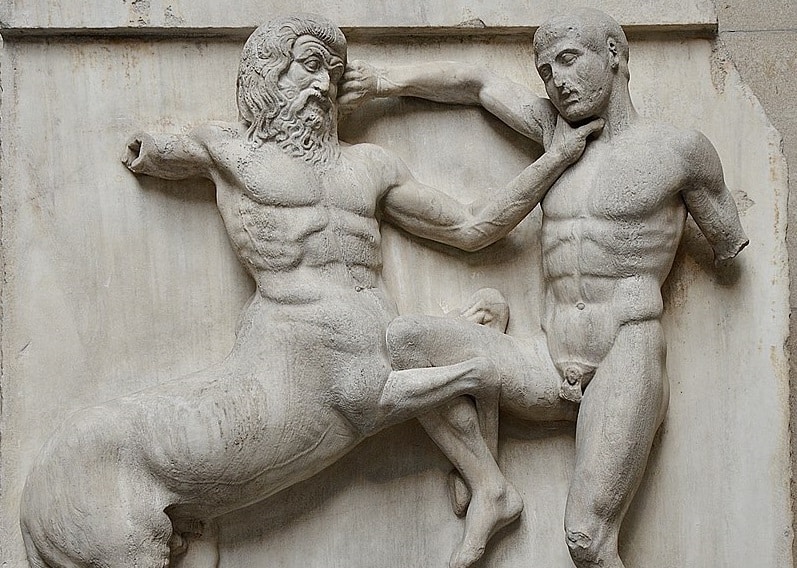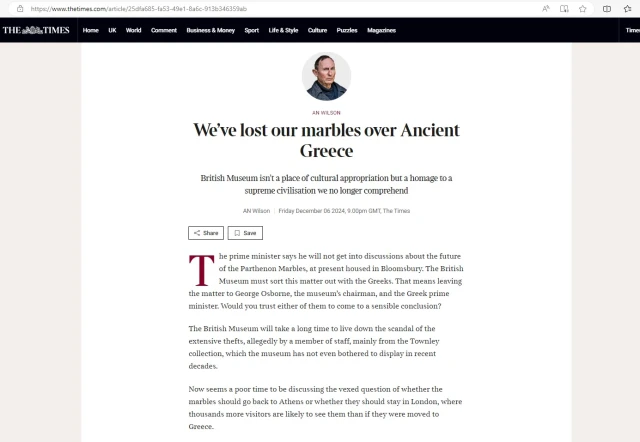

A battle between a centaur and a Lapith — part of the Parthenon frieze (British Museum)
A recent opinion piece published in the Times has sparked debate, as a British intellectual argues against the return of the Parthenon Sculptures to Greece. This stance stands in opposition to the growing diplomatic discourse between the UK and Greece regarding the rightful location of these cultural treasures.


The Argument Against Returning the Sculptures
In the piece, A.N. Wilson argues that the Parthenon Sculptures should remain indefinitely at the British Museum. He claims that modern humanity, including both the British and the Greeks, is incapable of appreciating the true value of these unparalleled works of art. Wilson does not hesitate to criticize both the current Greek government and key figures like George Osborne, the president of the British Museum.
His article serves as a reflection of a broader sentiment prevalent in British society, questioning the practicality and implications of returning the Parthenon Marbles to their place of origin. Wilson suggests that more people would see and appreciate the sculptures if they stay in London rather than if they are returned to Greece.
Cultural Heritage and Ownership
Wilson’s article, titled “We lost our marbles over Ancient Greece,” plays on the dual meaning of “marbles” – both referring to the sculptures and the idiomatic expression meaning to go insane. He criticizes the ongoing debate of repatriating the sculptures, viewing it as excessive and lacking substantial foundation.
The article delves into historical and philosophical discussions, pointing out that the very concept of a museum as a place where a Western nation displays art from another culture has become increasingly scrutinized in the modern era. Wilson urges readers to view the British Museum not as a place of cultural embezzlement but as a tribute to a civilization whose depth and significance modern societies struggle to grasp.
Historical Perspective and Modern Challenges
Wilson touches on the complexities surrounding the Parthenon Sculptures, highlighting how even the terminology used to describe them can imply a certain stance on their ownership. He observes that while the 19th-century Hellenists admired Greek culture, today’s society may lack the philosophical and cultural depth required to truly appreciate these masterpieces.
In the article, Wilson questions whether today’s populace, influenced by modern consumerism and cultural trends, can truly engage with the ancient messages of democracy and wisdom that the sculptures represent.
Ultimately, the article challenges readers to reconsider the implications of cultural heritage and ownership, suggesting that the debate over the Parthenon Sculptures’ future is far from straightforward, requiring careful thought and consideration from all parties involved.
Greece’s National Security Council, chaired by Prime Minister Kyriakos Mitsotakis, is meeting today to address…
Greece has submitted plans to the EU to organize maritime activities like fishing, tourism, and…
Prime Minister Benjamin Netanyahu congratulated Hapoel Tel Aviv's basketball team on their Eurocup win, praising…
Greece plans to launch 10-15 satellites by 2027, developed by local companies with government support.…
SKY Express will illuminate Greece this Easter 2025, carrying the Holy Light from Jerusalem to…
With Easter approaching, Greek shoppers face a 9% increase in the cost of their traditional…